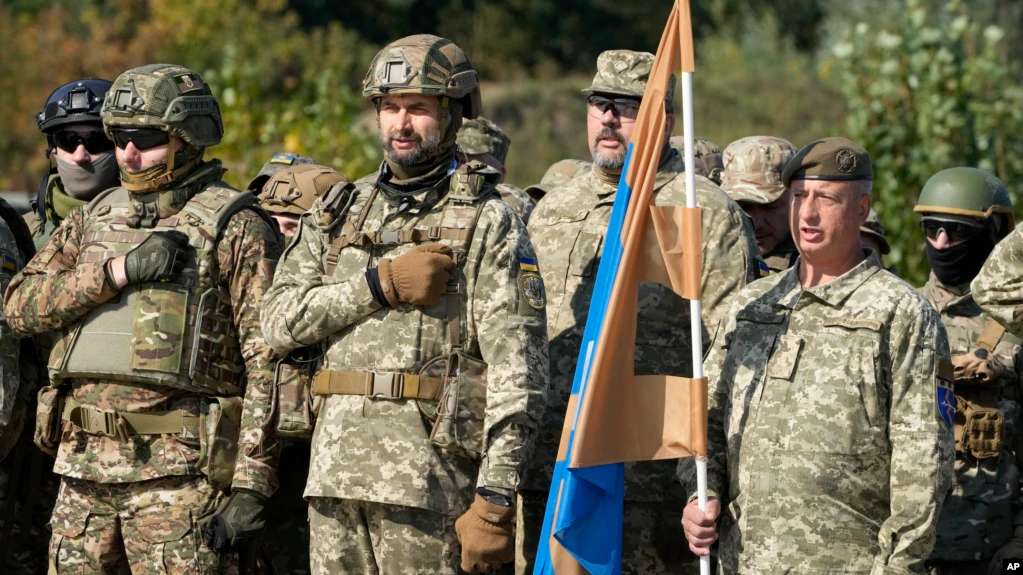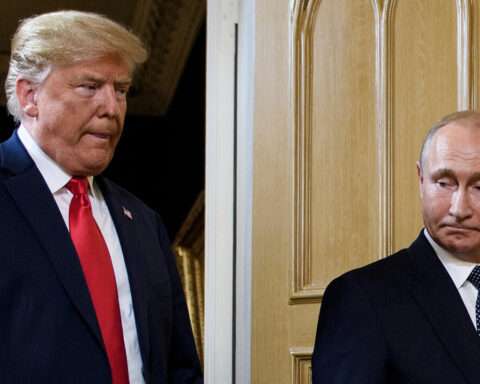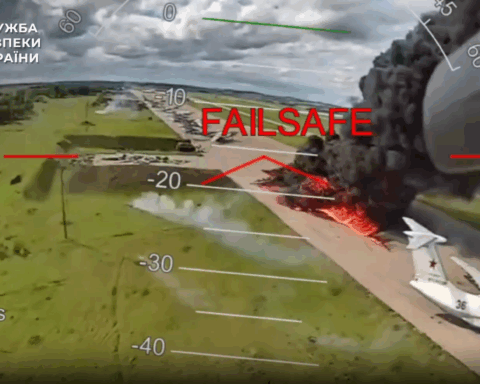SVYATOHIRSK, UKRAINE — Manning checkpoints and patrolling towns and cities: the reservists of Ukraine’s territorial defense force are the last line standing between ordinary civilians and Russian troops.
Standing 2.07 meters (6 feet, 9.5 inches) and dressed in camouflage fatigues that reveal only his eyes under a hood, “Buffalo” quit his job in construction and signed up for the force when the Russians invaded.
A cheerful young man in his 20s, he is one of the hundreds of thousands to answer President Volodymyr Zelensky’s call for reservists.
He was posted to Svyatohirsk, a village about 30 kilometers (20 miles) north of Kramatorsk, the capital of the Donbas region in the east of the country.
The front lines are just 10 kilometers to the north and northwest, where fighting rages and the sound of intense bombardments can be heard daily.
Fighting is particularly fierce around the town of Izyum. Victory there for the Russian troops would open the way toward Kramatorsk.
“I’m sure you can hear the artillery,” Buffalo told AFP. “And how our villages are disappearing from the face of the Earth.”
He proudly shows a video on his mobile phone that shows him with his comrades deployed for combat in the snow, Kalashnikov in his hand.
But his mission also includes protecting and helping the local civilians.
“The civilians have learned what war is,” he said. “They stay in the basements and it’s all they can do to stay alive.
“Any time we can, we bring them food and water. There are a lot of elderly people there who have no place to go.”
There are still a good number left in the village of Svyatohirsk, which had a population of 5,000 before the war, and was then best known for its Orthodox monastery.
Behind the counter of his little cafe Andriy is kept busy. Local people mix with soldiers and reservists as they line up for a hot dog, a hamburger or a hot drink.
“Some people have left and others have stayed,” he said.
“The people are here. Everybody is walking around, shopping — one way or another they have to eat.”
Dressed in fatigues with a Kalashnikov slung over his shoulder, reservist Andriy, 35, is among the customers.
For him, the territorial defense force is unique.
“We have people of all ages and from different backgrounds who all came together because they had only one goal. Teachers, engineers, workers, artists, it’s extremely important,” said the young man, a civil servant before the war.
“We will hold on until the last breath,” he said.
Many bridges in the region have been destroyed by the Ukrainians to slow down any advance by the Russians as Moscow turns the focus of its offensive toward the Donbas region.
The one in Svyatohirsk is still standing, even though mines are ready to blow it up.
Previously guarded by the territorial force, regular soldiers now keep watch over it.
“The bridge is under the protection of both the Ukrainian armed forces and the territorial defense,” said Volodymyr Rybalkin, a civilian journalist and head of territorial defense in the town.
Like many members of the territorial defense, he already had combat experience during the Donbas war in 2014-2015.
“Above us there are professional military commanders, who coordinate. Our task is to communicate with the civilians so that there is understanding and support between the two,” he explained.
Asked about Moscow’s announced offensive, he appears confident.
“The front line is less than 10 kilometers away. The artillery is firing at full strength and pushing the enemy back,” he said.
“I can’t predict what will happen tomorrow. Today (Russian) planes didn’t fly. We don’t know if tomorrow they will be back. We’ll react to all their actions.”
Behind him, “Buffalo” leads a refrain addressed to Russian President Vladimir Putin.
“Glory to Ukraine!” he bellows.
“Glory to the heroes!” his comrades reply.






